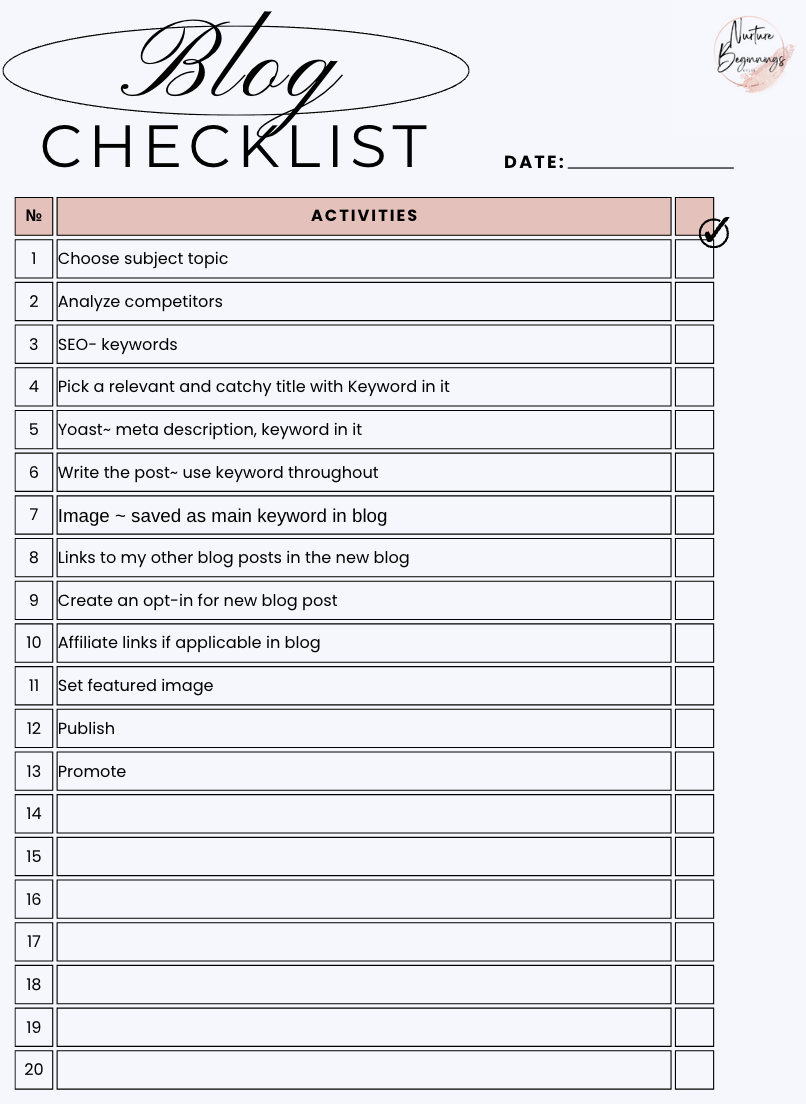This post may contain affiliated links, which means I’ll receive a commission if you purchase through my link, at no extra cost to you. Read the full disclosure statement here.
This post is all about blogging for beginners.
I remember looking at other successful blogs and thinking I could never create that and feeling overwhelmed. Well, I was right I couldn't because that was not me behind that blog it's not my style or my personal touch. You can't create those blogs either because they are not you! Your blog will be better because it's your blog!
After you are done reading this you are going to feel more confident and hopefully pumped to start your blog.
BLOGGING FOR BEGINNERS
1. Why Do You Want To Blog
Why do you want to start to blog? Is it to make extra money? Do you want to start a new hobby? Does it sound fun, and you want to try it out? Are your friends bloggers, and you want to feel like part of that group? Or is it something more like you have a passion for a specific topic that you'd like to share advice with the world?
Is it okay to start a blog because you want to start a new hobby, absolutely! However, don't expect to make money from your blog if you are only writing as a hobby. It's also okay to not make money from your blog if that's not your goal.
Most people start blogs because they want to make money online on the side. If this is you, then you need to find your why. Once you have defined your why, write it down and post it where you will see it all the time. When you feel burned out, writer's block, discouraged, or unmotivated, revisit your why. Your why will carry you through the harder times of blogging because while this is fun, it's not easy.
2. Finding Your Niche
When I first began blogging, I hated the word niche. It was everywhere I looked, and what did it even mean? I think I hated the word because I was overcomplicating finding my niche, when really, this should be the fun and exciting part.
A niche is a smaller topic under a big umbrella topic. For example, personal finance could cover so many different subjects however, if you niche down to investing then you will only write blog posts covering investing.
Having a niche allows you to create an online community. It makes writing your blog posts easier. Can you imagine writing about any topic all of the time, it's harder to come up with ideas. You will become an "expert" in your niche area, making it easier to write.
What are you passionate about or have knowledge and expertise in? Is it cooking, fitness, traveling, parenting advice, homeschooling, pets, or personal finance?
3. Research Blogs In Your Niche
If your goal is to make your blog a business that makes money, then you need to google your niche. Is it something that can make money? If not, then you will want to revisit finding your niche.
Now, research other blogs in your niche, paying attention to what they are saying about the subject. Gather ideas of the style of blogging in the niche. What are they including in their blog posts? Do they have images, bullet points, table of contents, graphics, headings, etc.
Take notes of what is being covered in this niche and what is something unique that you can bring to the table. You want to set yourself apart from the others but yet be included in the niche. Doing a little research in the beginning can help you see what the gaps are in the subject and allow you to fill them with your blog!
Take notes on the following:
- things that you like; colors, voice tone, images, etc
- things you don't like; above, plus anything that throws you off (I don't like pop-up ads while I'm reading a blog)
- good blog post ideas
- literally anything else
WANT A FREE BLOG CHECKLIST TO KEEP YOU PRODUCTIVE AND DON'T FORGET ANY STEPS?


4. Perfect Blog Name
Did you know that most bloggers would change their blog name if they could go back in time? That's how important it is to take your time to choose the perfect blog name. Choosing the right name can attract the right audience that you are targeting.
Do you have plans to sell your blog at a later time? If so, then stay clear from using your name.
Complete these tasks before naming your blog:
- what will your blog be about, your niche
- who is your target audience
- check out your competition blog names
- brainstorm potential name ideas
- check if the domain is available
- check if the social media are available
- sleep on it
5. Choose a Host and Domain
There are so many options available when it comes to this step. There are two types of hosting: self-hosted and hosting. I recommend purchasing a self-hosted blog. These tend to be a little more technical to set up. However, there are videos to help with this step. When you purchase a self-hosted website you are the owner and can do as you please with it. Whereas, when you rent hosting they are the landlord and have more restrictions. I chose to go with Bluehost.
You will want to purchase your blog name and domain. Again there are so many tools to purchase this at. I used GoDaddy and it was fairly cheap and easy to set up.
6. Design Your Blog
You have reached the most fun and exciting part of starting your blog! Review the notes you took when researching blogs in your niche. These notes will direct you toward the style, tone, and colors you want in your blog.
Depending on the host website you have chosen, they will have themes that you can customize. Or you can purchase a theme to match your style. I love all of the 17th Avenue designs! The design came with step-by-step directions for uploading the design into Bluehost.
I recommend having the following blog menus: home, about, and the category names of your blog on your main menu. If you're not sure what blog categories are, or names to use, read Blog Categories 101. Ensure that your blog pages are cohesive to a mobile view, as most viewers read from their phones.
7. Write Your Blog for Beginners
I recommend using Keywords Everywhere. You do have to pay for the service, but it's so worth it! When you put into Google your blog post idea or words regarding your subject, Keywords Everywhere will tell you the number of times that keyword has been searched. Partially input your keyword and, see what pops up in Google, write all of those keywords down. Also, look at people search for and related searches at the bottom of the page. These will come in handy when writing your post.
Print out a calendar or use an electronic one! Go to Google Trends and input the keywords you just researched. Select the past 12 months, and you'll see a graph of when that keyword is searched the most. The peak months are the months to publish your blog post for that specific keyword. If Christmas recipes are your keyword, Google Trends is most likely going to show that it is searched the most in October and November. You will want to post your blog regarding Christmas recipes during that timeframe. We want to be on Google's good side when it comes to using the right keywords and timeframe.
Now, jot down blog post ideas according to what season those topics are most popular. For example, if you have a cleaning blog, you will want to post about Spring cleaning tips and hacks in late March!
You have your keywords and which month to post now it's time to write and publish your first blog post! Don't get hung up on being perfect, perfect doesn't exist. Once you become more seasoned you can update your blog posts later.
There you have it how to start blogging for beginners.
WANT A FREE BLOG CHECKLIST TO KEEP YOU PRODUCTIVE AND DON'T FORGET ANY STEPS?


